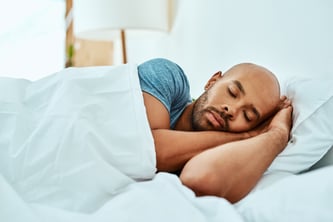 Nearly half of healthcare workers (45 percent) in the U.S. sleep less than seven hours a night, according to research featured by NPR. In fact, healthcare ranks as the second most sleepless profession.
Nearly half of healthcare workers (45 percent) in the U.S. sleep less than seven hours a night, according to research featured by NPR. In fact, healthcare ranks as the second most sleepless profession.
Dealing with severe illnesses and injuries throughout the day and coping with life-or-death situations can make it challenging to let go and to turn the mind “off” at night. You might also be on call, making it nearly impossible to detach from the demanding schedule and pressures of work. In addition, cultural shifts to 24/7 lifestyles, on-demand entertainment, non-stop social networking and digital technology have only exacerbated the insomnia problem.
Less than seven hours of sleep is linked to obesity, increased risk for heart disease, stroke, diabetes, anxiety and other mental health issues, according to the report by NPR. In the short term, lack of sleep can cause a decrease in attention span, poor reaction time, poor decision-making, increases in miscommunication, lethargy and fatigue, and many work-related accidents are directly tied to poor sleep. Alarmingly, for many healthcare workers, the norm is five or six hours per night. This can be extremely hazardous to your own health and may even pose a risk to patient health and safety.
As a medical professional, you are well-informed about the dangers of not getting enough sleep, so let’s dive into some ways you can improve your sleep habits.
10 Ways to Help Improve Sleep Habits
- Manage your stress. One of the biggest factors related to lack of sleep is stress. Regular exercise and a healthy diet can help negate some of the effects of stress. Practicing meditation or mindful breathing can also help reduce your levels of stress.
- Practice “Digital Balance.” Instead of being on your phone or watching TV before bed, read a book, meditate or listen to relaxing music instead (anything quiet, sedentary, that helps get your body ready for bed.) Set a time each night where you turn all electronic devices off. Even if it’s just 30 minutes before you go to bed, it can help prevent you from checking that email one last time or scrolling through your social media feed.
- Limit your caffeine intake and avoid excessive alcohol consumption before bed. Check the caffeine content of any soda and energy beverage that you drink. Some foods such as chocolate, and medications such as some pain relievers, contain caffeine. Consider eliminating any caffeine consumption past noon. One common misconception is alcohol helps you fall asleep and stay asleep; however, drinking before bed interrupts your circadian rhythm and blocks REM sleep, inhibiting your quality of sleep overall.
- Squeeze in a nap when you can. Many people are afraid to nap during the day, thinking they won't be able to sleep at night. Short naps (about 20 minutes) can help restore "sleep debts" accumulated during sleepless nights and often make it easier to sleep again later.
- Increase your daylight exposure. Melatonin is a naturally occurring hormone controlled by light exposure that helps regulate your sleep-wake cycle. Working in dark spaces during the day can confuse your body. Try to take your work outside in sunlight. If this isn’t possible or if you live in more northern latitudes during winter months, consider using a light therapy box to increase your exposure.
- Decrease your nightlight exposure. Instead of sitting in front of a brightly lit TV or computer screen, try listening to music or audio books, or reading by lamplight for 2-3 hours before you try to sleep. When it's time to sleep, make sure your room is as dark as possible, or use a sleep mask to cover your eyes.
- Exercise vigorously, just not before bedtime. A sedentary lifestyle is a known risk factor for insomnia, but so is vigorous exercise in the hours just before you want to sleep. The best times to exercise are before work, at lunch, during a break or immediately after work.
- Breathe and meditate. Meditate or practice mindful breathing exercises during the day and then again at bedtime. There are tons of podcasts, apps and other audio options that can guide you through the steps. Start with five or ten minutes each day.
A quick mindfulness exercise: As you fall asleep, focus on your breathing, counting inhales and exhales instead of sheep. If your thoughts wander, bring your attention back to your breathing.
- Try a white noise machine. If the sound of a garbage truck, a dog's bark or a spouse's snoring awakens you or keeps you from getting to sleep, a white noise machine can help. They not only block distracting noises, but also provide soothing sounds that help many people relax and fall to sleep.
- Practice good “Sleep Hygiene.” Sleep hygiene refers our typical sleep environment. The bedroom should not have anything in it that tends to interrupt a good night’s sleep including TVs, lights, computers, and yes, even pets on your bed! In addition, good sleep hygiene also includes a comfortable mattress and a cool, quiet, dark room.
We Can Help
As part of your Well Being Resources you have access to Peer Coaching, WorkLife Concierge, in-the-moment and face-to-face counseling, financial/legal resources and more. For support in getting a better night of sleep and to access your Well Being Resources, contact us at 877.731.3949 or through your VITAL WorkLife App.
Sources:
Seaward, B.L. (2015). Sleep Wellness, Digital Detox and Mindfulness. Paramount Wellness Institute, Boulder, Colorado
https://www.beckershospitalreview.com/workforce/healthcare-workers-aren-t-getting-enough-sleep.html
https://dumbbellsreview.com/25-reasons-why-a-good-nights-sleep-is-essential/
“Working Americans Are Getting Less Sleep, Especially Those Who Save Our Lives: U-M LSA Department of Psychology.” LSA, lsa.umich.edu/psych/news-events/all-news/faculty-news/working-americans-are-getting-less-sleep--especially-those-who-s.html


